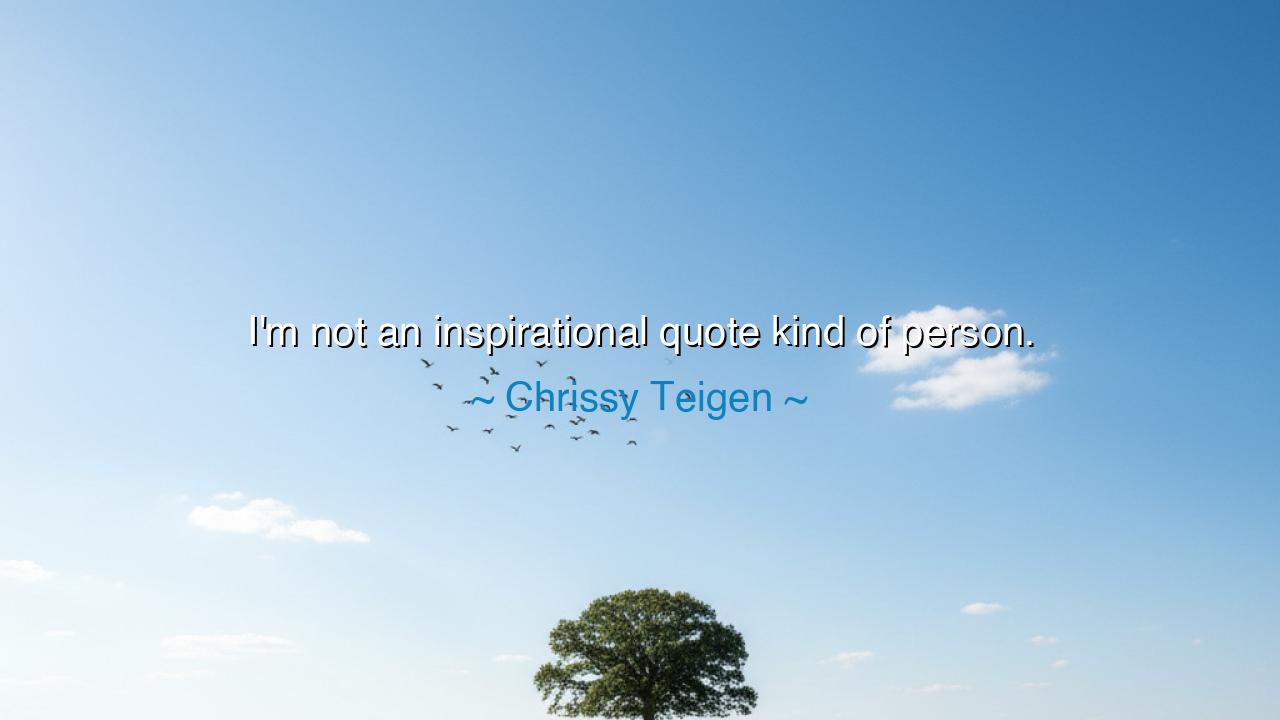
I'm not an inspirational quote kind of person.






In the words of Chrissy Teigen, a woman known for her candor and wit, we find a declaration that is, in its own way, profoundly philosophical: “I’m not an inspirational quote kind of person.” At first, these words may sound simple — even dismissive — yet they carry within them a deeper wisdom about authenticity, truth, and the nature of human expression. For what Teigen rejects is not inspiration itself, but the shallow imitation of it — the polished phrases that promise enlightenment but often fail to touch the heart. In her refusal lies an ancient kind of honesty: the courage to live one’s truth rather than to decorate it with borrowed words.
When Teigen says she is not an inspirational quote kind of person, she reminds us that the greatest inspiration is not always found in words carved on walls or whispered in perfect symmetry. It is found in the messiness of real life, in laughter, in tears, in the unfiltered moments of being human. Hers is a rejection of false idealism — a return to authenticity. The ancients would have understood this well. The philosopher Diogenes, who lived in simplicity and scorned pretense, once walked the streets of Athens carrying a lantern in daylight, searching for an honest man. Like him, Teigen’s words are a light of truth: she seeks sincerity, not perfection; reality, not performance.
We live in an age saturated with inspiration — or rather, the illusion of it. Quotes flow endlessly through screens and feeds, each one promising strength, peace, or purpose. Yet so often, they fade as quickly as they appear. Teigen’s rejection of this ritual is a rebellion against superficial comfort. She reminds us that inspiration cannot be mass-produced. True growth does not come from repetition of slogans, but from the quiet, often painful work of self-understanding. The ancient mystics would call this “the work of the soul” — not something that can be captured in a sentence, but something that unfolds across a lifetime.
Consider the story of Socrates, who never wrote a single line of wisdom, though his name became synonymous with philosophy itself. When asked why, he said that truth must be lived, not written. Words, he warned, are hollow when they are not embodied. In this light, Teigen’s statement becomes a modern echo of Socratic thought: to live truthfully is better than to speak beautifully. To reject empty inspiration is, paradoxically, to embrace the truest kind of inspiration — that which is lived, breathed, and acted upon in the world.
Yet there is also humility in her words. To say “I’m not that kind of person” is to acknowledge one’s own temperament — to accept that not all are called to preach or to perform virtue. Some lead by example, not proclamation. Some inspire precisely by refusing to pretend. The ancients valued such self-knowledge. The Oracle at Delphi bore a single command above its entrance: Know thyself. Teigen’s confession aligns with this timeless truth. She knows who she is — and who she is not. In a world obsessed with posturing and positivity, this self-awareness becomes its own act of quiet heroism.
Her words also hold a mirror to our times. Too many seek inspiration as a substitute for action — a burst of emotion to avoid the discipline of change. But the wise understand that inspiration, if it is not followed by effort, is but smoke in the wind. Teigen’s stance reminds us that sometimes it is better to stop searching for motivational words and instead live the life that others might one day quote. For action itself is the highest form of eloquence, and honesty the purest kind of poetry.
So, dear listener, let this simple statement be a guide for your own soul: do not chase inspiration as though it were something outside of you. Do not fill your walls or your heart with phrases that promise what only courage can give. Be, instead, like Chrissy Teigen — grounded, genuine, unafraid to say, “I am not that kind of person.” For in that truth, you will find freedom. Let your deeds be your quotes, your kindness your philosophy, and your authenticity your inspiration. The world does not need more words about greatness — it needs more lives that embody it.
Thus, the lesson is clear: true inspiration does not live on parchment or screens. It lives in the heartbeat of those who dare to be real.






AAdministratorAdministrator
Welcome, honored guests. Please leave a comment, we will respond soon